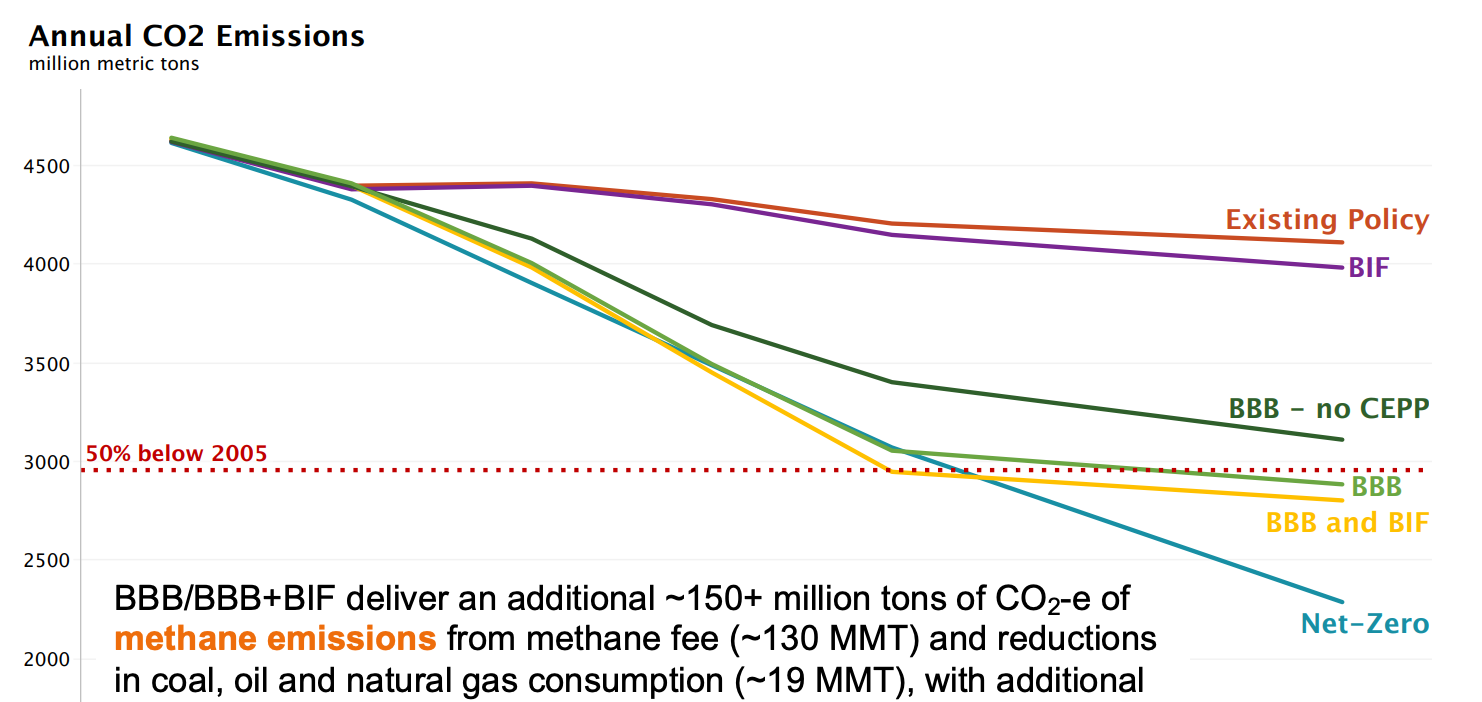103: COP BIF BBB WTF

It just keeps going and then after a while we die
--
Today we are going to do one of those issues where we get up to speed together on what is happening in big climate news, namely legislation in U.S. Congress and whatever in god's name is happening in Glasgow right now. It's entirely possible that you are already up to speed on this stuff or you understandably find it all pretty boring. But as is my way, I promise I will get in some good burns and witty banter and make it pretty straightforward so when all is said and done you can have at least a rough sense of what if anything you can be kind of happy about and what stuff you should be pissed about.
It will be link and quote heavy as a lot of these developments I am still getting my head around and as I type, it looks like COP26 is going into extra innings and there is still plenty of contentious debate left. It reminds me of this anecdote I saw on the internet where a baseball fan was watching a game with his significant other who was not a baseball fan, and there were no runs scored and it was getting late and she said, what happens if nobody scores? And he said, it just keeps going. And she was like that's the dumbest thing I've ever heard. And that is kind of what climate negotiations are like except it just keeps going and then after a while we die.
Before getting into some of the details I will say that while I'm not one of those weirdos who watches diplomatic negotiations as though they were some kind of a sporting event, I am surrounded by quite a lot of chatter and news about COP26 and had some big picture reactions.
The main thing I noticed was that, while COP26 attracted more media attention than I can remember these things getting, the discussion around it was eerily disjointed. On any given day I would watch Twitter avatars of people in expensive suits talking about how exciting and important these talks are and after whatever news of the day would be like, "this is a really, really big deal!" And simultaneously I would see protestors and advocates more or less saying that this whole thing is a gigantic crock of bullshit. That we are basically watching elites shuffling around deck chairs, in denial about the extent to which the economy needs to be disrupted, unwilling to do anything that might disturb profits or economic growth, and generally tolerant of some level of consequences that will mostly harm countries and communities that did nothing to cause this problem.
You can probably guess where I fall on that divide, although to be honest I do think diplomacy is important and good things can come out of it. But I got the feeling that the stark difference in tone isn't a result of ignorance or denial on the part of optimists, but a form of lockstep insistence on projecting to the world that thing are going great. It is as if a memo went around saying, celebrate, always celebrate. I noticed a similar tone amid some discussions of the infrastructure bill that passed (annoyingly called BIF, for bipartisan infrastructure framework), heralding it as a climate victory, when it is no such thing. Large, white-led NGOs and their staff were oddly gleeful in public statements and social media at both the bill's passage and progress at COP.
I understand the desire to celebrate victories and to maintain optimism, and I guess if you're in climate negotiations that's kind of a necessary personality trait. But I also think there is a near enemy, which is insisting that things are going swell, which feels like an extension of climate discourse "rules" for decades—don't scare people, don't make people feel hopeless, don't tell them the truth or they will simply shut down and disengage. As far as I can tell that wisdom was the result of like one study that some communications professor did in 1997 (fact check me if you want idc) and it has not worked out that great. I find a healthy dose of pessimism to be quite useful, especially when there is ample reason for it.
Aside from the optimism/pessimism divide, there are many other divides at COP26, which were on full display for the past two weeks. I've written a bunch about how as climate change worsens, we're going to see a cleaving of society into people for whom things are bad but because they are rich they get by OK, and other people living in complete dystopia. And I feel like in these corporate friendly climate summits, that first camp really shows their asses, and the second camp gets increasingly enraged.
A Boston Globe correspondent summed this up nicely in a recent color piece from COP. “I can actually watch the people in power just sitting there having a nice day, having a cup of wine,” a German college student and COP protestor told her. “I’m furious, of course. It’s about our future.” And in another case, “This is now a global north greenwash festival,” Greta Thunberg said, as the crowd cheered and clapped, “a two-week-long celebration of business as usual and blah blah blah.”
Emily Atkin and others pointed out that climate-vulnerable nations and civil society groups are underrepresented, with the COP26 Coalition calling it the "most exclusionary COP ever." Meanwhile, outside the event more than 100,000 protestors, largely youth, Indigenous and people from the Global South, engulfed the event, kept in check by hordes of police. More than 700 activists from civil society groups protested inside the conference on the last official day. Demonstrators attacked the glacial pace of the talks, the unwillingness of wealthy countries to pay climate reparations to countries that will soon be underwater as the cost of their indulgences, and the catering to industry that happens within the halls. Another Globe writer described a different scene inside the event:
"Inside the sprawling maze of the conference center, many countries created pavilions similar to commercial booths at conventions. One featured three mock polar bears wearing life vests, while another showed off hydrogen-powered cars. The Malaysians handed out doughy desserts, while Norway offered candy."
Somini Sengupta of the Times noted the striking gender breakdown among negotiators and protestors—of 130 presidents and prime ministers gathering in Glasgow, she notes that fewer than 10 were women, and the average age was well over 60. "Those with the power to make decisions about how much the world warms in the coming decades are mostly old and male. Those who are angriest about the pace of climate action are mostly young and female."
Nathan Thanki, a co-coordinator for the Global Campaign to Demand Climate Justice, put it, "I thought I was coming to Glasgow, not Davos. #COP26 has been a corporate circus and you see the effect in the draft outcomes - references to 'nature based solutions,' private finance. Celebrities, US congresspeople and their entourages clog the halls. Bullshit clogs the text."
The inside/outside divide is starker than ever, and it feels like those on the outside are no longer holding out much hope for the official process, if they ever did. That it has essentially become a trade show or PR event in which splashy promises betray the negotiating stances that wealthy negotiators take behind closed doors along with wholly insufficient progress on things they've already promised. There was some segment of activists who around 2015 took a tone of "COP sucks but we have to make it work" who are now more along the lines of simply "COP sucks."
I'll get into a few of the details that are making people so mad (or "excited to be be a part of such a historic event!!") but that's kind of the feeling I picked up over the last two weeks. The anger and frustration is palpable, weirdly offset by those celebrating victory.
What exactly is happening at COP26?
You guys maybe know all of this but just in case the "Conference of the Parties" is an annual event in which world leaders and their representatives gather to check in on progress on climate change and make various commitments, agreements, etc. And every five years (six because of COVID), they are supposed to gather and assess how countries are doing on their voluntary commitments under the 2015 Paris Agreement, ideally "ratcheting them up" to meet the challenge. If only doing that every five years sounds insufficient I would agree with you. And if you were wondering why they are just voluntary, it's in large part because the U.S. Senate would never ever ratify a binding treaty.
Negotiations are still underway and going beyond today's planned deadline, nations have failed to sufficiently ratchet up their commitments. There are various ways you can total this up, but the worst interpretation is that the commitments are on pace for 2.4 degrees of warming, which is catastrophe. There's a middle estimate of 2.1 degrees, and an optimistic estimate of 1.8 degrees. To put a finer point on this, it's not just the sum total. Although 22 countries improved their pledges, ZERO major economies are compatible with the Paris Agreement's goal of 1.5 degrees. Some nations are on a trajectory closer to 4 degrees, which is hell planet territory.
But at least they are making progress, right? It's not 3.7 degrees like it used to be. Well I guess, except for many countries are not on track to hit the insufficient commitments that they have agreed to. AND, a Washington Post investigation found that the data countries use to report their progress on emissions reductions is basically bullshit, with an enormous gap between what they say they are emitting and what they actually are. A lot of the discrepancy has to do with how much countries claim their land use, meaning trees, wetlands, etc, is offsetting carbon emissions, which you will not be surprised to hear is one of the most beloved climate solutions of corporations.
All of this is why critics are calling the negotiations "toddler steps" or saying that the COP26 is an outright failure. Bill Hare, the chief executive of Climate Analytics, told the Guardian: “We are concerned that some countries are trying to portray [Cop26] as if the 1.5C limit is nearly in the bag. But it’s not, it’s very far from it, and they are downplaying the need to get short-term targets for 2030 in line with 1.5C.”
Sticking points
As I mentioned, negotiations are going into overtime last I checked and there are some sticking points in negotiations that are illustrative of the middling progress and borderline comic resistance from wealthy nations and industry to yield any ground.
Right now it is basically looking like the negotiations will result in everybody having to increase their emissions reductions commitments next year, instead of waiting another five years. This is being portrayed by some as a victory, but honestly, let's go home and try again next year doesn't exactly instill confidence.
It's possible we will still see some 11th hour triumph, but on the morning of the last day, advocates were very unhappy with late-night revisions that were made to the text of the agreement negotiators have been trying to hammer out, saying it was “watered down terribly overnight.” (Check out a pretty good breakdown here.) Again, some people are looking at it and saying wow real improvement, others are saying this is basically being written by industry lobbyists But it certainly doesn't look good.
For the first time it would have added into the agreement that fossil fuel subsidies must be phased out. But the current language added a critical qualifier to call for the phase out of "inefficient subsidies for fossil fuels.” Meaning efficient subsidies are totally rad and A-OK. For the record this is exactly the kind of self-contradictory language we see as corporations co-opt the idea of just transition.
Advocates see this as opening the door to continued payoffs to the oil and gas industry: “The next time someone says ‘fossil fuel subsidies’, remember they are talking about our so-called ‘leaders’ using working people’s taxes to invest in the deaths of children and the planet," said South African human rights activist Kumi Naidoo.
Also changed: the "phaseout of coal" became "phaseout of unabated coal" and "renewables" was changed to "low-emissions energy systems" which is likely code for natural gas. None of this is surprising considering for years, several nations have fought to have the mere mention of fossil fuels off limits in treaty documents, which is wild, like negotiating over disarmament and not being willing to say the word "weapons."
And, you will not be surprised to know that the fossil fuel industry itself is crawling all over COP26. One report found that the fossil fuel industry has more delegates than any nation at the summit—503 representatives. "This is larger than the combined total of delegates from Myanmar, Haiti, the Philippines, Mozambique, the Bahamas, Bangladesh and Pakistan, the regions and countries worst affected by climate change."
Another point of contention is to what extent wealthy countries are going to pay for the damage their ever-fattening economies are causing. Rich countries are already not meeting their commitments in terms of climate funding—in 2009, they agreed to pool $100 billion by 2020 and so far they've commited more like $79 billion. “Everybody here is livid,” Saleemul Huq, a climate science and policy expert from Bangladesh told the LA Times. “They reneged on their promise. They failed to deliver it. And they seem not to care about it. And so why should we trust anything they say anymore?”
There has been heated debate over the scope of climate reparations (euphemized as "loss and damage") that must be paid to countries that will suffer the worst consequences at the hands of wealthy carbon emitters. In the late hours of the conference, negotiators from the Global South are saying the US and EU's refusal to give more money or agree to a loss and damage fund was a key sticking point.
Is everything so, so awful?
No, there are some bright spots that emerged from the negotiations! Here are some of them. Feel good for a minute:
- The Beyond Oil and Gas Alliance was announced yesterday, a rare component in UN climate talks that acknowledges the need to phase out production of fossil fuels. It even has eight nations signed on (not the US obvy).
- Some philanthropies are advocating for a loss and damage fund, and committing $3 million to get it started.
- US and China made a surprise, last-minute agreement, albeit extremely vague, to work together to reduce emissions. They alone make up 40% of emissions.
- More than 100 countries agreed to end deforestation by 2030. The announcement was celebrated, although many pointed out that a similar 2014 pledge did just about nothing.
- More than 40 countries agreed to end coal mining. The U.S. did not sign the pledge lolz.
- More than 100 countries agreed to cut emissions of methane by 30% by 2030.
- More than 20 countries and a bunch of car makers agreed to phase out gas and diesel vehicles by 2040 or sooner. (Not the US, China or Germany who have been known to make some cars)
The US is still holding back progress
You might be seeing a pattern here which is like, something good happened but the US isn't participating. Or all of these countries want to do this thing but the US won't let them. That's because the US continues to suck on climate change really really bad. Elizabeth Kolbert did a nice little rundown of America's horrible track record in climate negotiations. The Guardian similarly points out that Biden is talking a big game but not delivering much at all, and the US is actively working against progress behind closed doors.
I mentioned earlier that there is this impulse to put a happy face on current federal legislation's ability to reach our own climate commitment under the agreement, but all we've passed so far is old BIF, the infrastructure bill. That bill is not nothing, to be fair, and has a lot of good stuff in it like vehicle charging infrastructure, for example. But a lot of climate provisions were taken out of the bipartisan bill with the idea that the accompanying Build Back Better (BBB) plan would do the heavy lifting. Here check this out from Princeton's Repeat project:

And where, to paraphrase Jack Nicholson as the Joker, is the Build Back Better plan? It is on the way, we are periodically assured. You might call it a commitment, a pledge even.
--
Links
You have enough links from me today! I promise I'll get back to the regular link routine there have been a bunch of good articles but I swear if I look at another article right now I'm going to lose it.
--
Listening
I have been a pretty big Replacements fan for a long time and have been listening a bunch lately. I always loved this song Androgynous, but I will say when I listened to it when I young I heard it mostly as a love song. But if you listen to it today man it was maybe 30 years ahead of its time in challenging gender norms. Paul Westerberg wrote this in 1984! Great political music, it plants seeds, you know. It's a beautiful song. Mirror image, see no damage / See no evil at all / Kewpie dolls and urine stalls / Will be laughed at / The way you're laughed at now

--
That is all for today I hope I helped you to get a grip on the past couple of weeks in climate news and did not make you so depressed. Here is a funny story to go out on. Sometimes I talk in my sleep and say funny things and last week Jamie said I rolled over onto my back and said
"Wow. Woooooow. Everything. Everything at once."
So it seems like I basically achieved ego death in my sleep but sadly I do not remember it at all. Sounds like it was pretty cool though. I hope when you read this newsletter your reaction is similar. Talk to you next week and we will discuss everything. Everything at once. Wow.
Tate

